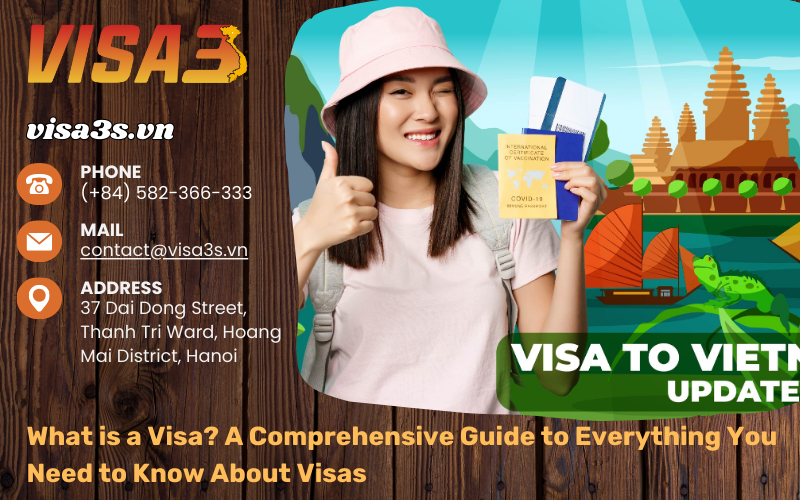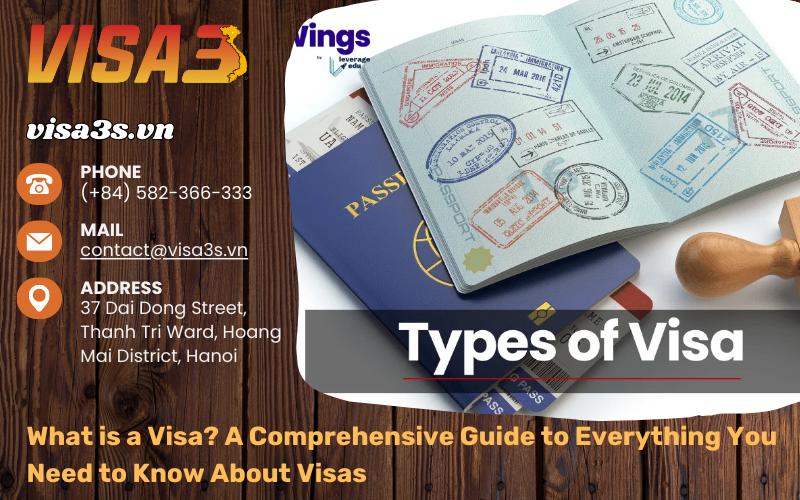A Visa is an essential document for international travel, allowing you entry into a foreign country. Whether for tourism, work, or study, understanding the visa application process is critical. At VISA 3S, we specialize in guiding you through this process efficiently. For inquiries, call (+84) 582-366-333.
I. What is a Visa?
A Visa is an official endorsement or stamp on your passport, issued by the authorities of a foreign country, granting you permission to enter, stay, or leave under specific conditions. The types of visas explained below will help clarify which one suits your needs.
1. Purpose of a Visa
A Visa serves as proof that you meet the requirements to enter a country legally. Different types of visas are designed for varying purposes, such as business, leisure, or study. Having a visa ensures that the country’s border control is aware of your intentions and that you comply with their regulations.
2. How Visas Work
Most countries require travelers to apply for a visa before arrival. However, some countries have bilateral agreements allowing visa-free travel, making it easier for travelers. The visa application process typically involves submitting required documents, paying fees, and sometimes attending an interview. Understanding this process can prevent unnecessary delays or rejections.

3. Common Visa Terms
There are certain terms associated with visas that you should be familiar with:
- Visa Validity: The period during which the visa remains effective.
- Single Entry vs. Multiple Entry: Indicates whether you can enter the country once or multiple times with the same visa.
- Visa Extensions: Procedures to extend your stay beyond the initial period granted.
II. Types of Visas Explained
Different visas cater to various travel purposes. Below is an overview of common types of visas explained to simplify your decision-making process.
1. Tourist Visa
A tourist visa allows you to travel to a foreign country for leisure and sightseeing. It is typically valid for a short duration, such as one to six months, depending on the destination. It does not permit employment or business activities.
2. Work Visa
A work visa permits employment in a foreign country. It often requires sponsorship from an employer and is specific to the job or field of work. Work visas may also include restrictions or conditions tied to your role in the company.
3. Student Visa
A student visa allows you to study abroad at an accredited institution. Proof of enrollment is usually required. Many countries also mandate proof of financial capability to ensure you can support yourself during your studies.
4. Business Visa
A business visa allows you to engage in business activities such as meetings, conferences, or negotiations. It is typically shorter in duration than work visas and does not permit full-time employment.
| Type of Visa | Purpose | Validity |
|---|---|---|
| Tourist Visa | Leisure and sightseeing | Up to 6 months |
| Work Visa | Employment in a foreign job | Depends on employment |
| Student Visa | Academic studies abroad | Duration of the program |
| Business Visa | Business-related activities | Short-term (varies) |
III. Visa Application Process
Understanding the visa application process is key to ensuring a smooth experience. Follow these essential steps:
1. Research Requirements
Each country has specific visa requirements checklists that include necessary documents like your passport, photos, and application forms. Requirements may vary based on your nationality, the type of visa you are applying for, and the purpose of your visit.
2. Submit Your Application
Fill out the application form and provide all required documents. Many countries now offer online visa applications for added convenience. Ensure that you double-check all information before submission to avoid errors.
3. Attend an Interview
For certain visas, an interview at the consulate or embassy may be required. Preparing with visa interview tips can help you succeed. Common questions include your reason for travel, duration of stay, and financial stability.
4. Pay the Visa Fee
Visa fees vary depending on the type of visa and the destination. Be prepared to make the payment in the format specified by the consulate or embassy.

IV. Tips for a Successful Visa Application
1. Avoid Common Mistakes
Ensure that all details on your application are accurate. Mistakes can lead to delays or rejections. For instance, mismatched information between your application form and supporting documents can result in denial.
2. Plan Ahead
Apply well in advance of your travel date to account for processing times. Knowing your visa validity and extensions is crucial to avoid overstaying. Some countries take weeks or even months to process visa applications, so plan accordingly.
3. Organize Supporting Documents
Include all required documents, such as proof of accommodation, travel itinerary, bank statements, and letters of invitation (if applicable). Missing documents can delay your application.
V. Frequently Asked Questions
1. What Happens if My Visa Expires?
Overstaying your visa can result in fines or legal issues. Check the visa validity and extensions policies of your destination. Some countries allow you to apply for an extension before your visa expires, but this is not always guaranteed.
2. Can I Travel Without a Visa?
In some cases, yes. Certain countries allow visa-free travel for specific nationalities. Research thoroughly before traveling. If your destination requires a visa and you attempt to enter without one, you may be denied entry.
3. What Documents Do I Need for a Visa?
The visa requirements checklist typically includes a valid passport, recent photographs, completed application forms, and proof of purpose of travel. Additional documents may be requested depending on the visa type.
Conclusion
Obtaining a visa is an integral part of international travel. Whether it is for work, study, or leisure, understanding the visa application process and adhering to the visa requirements checklist will ensure a smooth experience. At VISA 3S, we are committed to guiding you every step of the way. Contact us at (+84) 582-366-333 for expert assistance. If you need further clarification or personalized support, do not hesitate to reach out to us.
For more information, reach out to:
VISA 3S
Hotline: (+84) 582-366-333
Email: contact@visa3s.vn
Add: 37 Dai Dong Street, Thanh Tri Ward, Hoang Mai District, Hanoi


